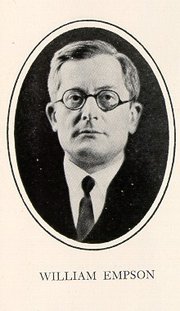William Empson
|
|
Sir William Empson (1906-1984) was an English poet and literary critic.
Empson is now best known for his literary criticism, and in particular his analysis of the use of language in poetical works, though his own poetry is arguably undervalued, although it was admired by and influenced English poets in the 1950s. In his critical work he was particularly influenced by the philosopher Ludwig Wittgenstein, whose own work is largely concerned with the problematics of language in expressing thought with clarity. His best known work is the book Seven Types of Ambiguity. This book was to have a significant impact on the New Criticism, a school of criticism which directed particular attention to close reading of texts, among whose adherents may be numbered F.R. Leavis.
His Milton's God was a sustained attack on Christianity and defence of Milton's attempt to 'justify God's ways to man'.
His poetry is clever, learned, dry, aethereal and technically virtuosic: his high regard for the metaphysical poet John Donne is to be seen in many places within his work, tempered with his appreciation of Buddhist thinking, and his occasional tendency to satire. He wrote very few poems and stopped writing poetry almost entirely after 1940. His Complete Poems [edited by John Haffenden, his biographer] is 512 pages long, with over 300 pages of notes.
Critical Works
- Seven Types of Ambiguity (1930)
- Some Versions of Pastoral (1935)
- The Structure of Complex Words (1951)
- Milton's God (1961)he:וויליאם אמפסון

